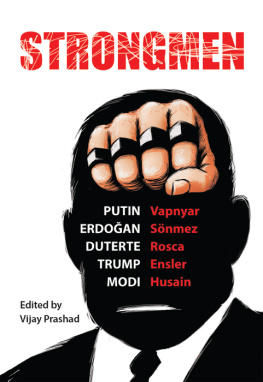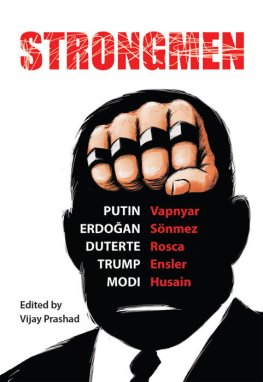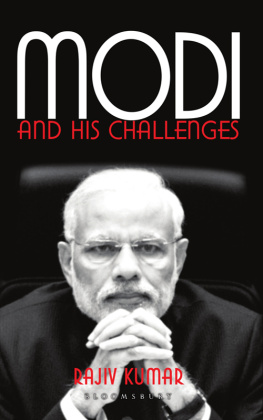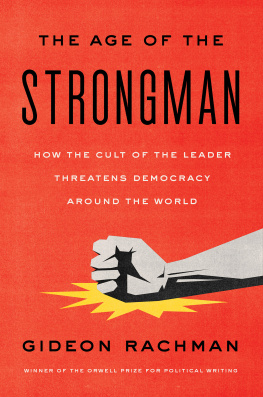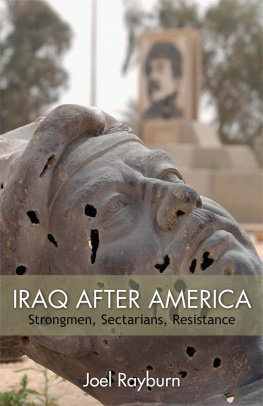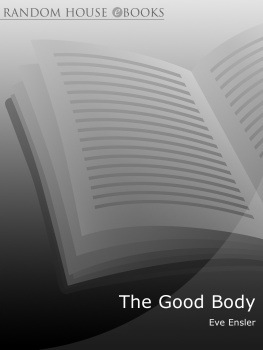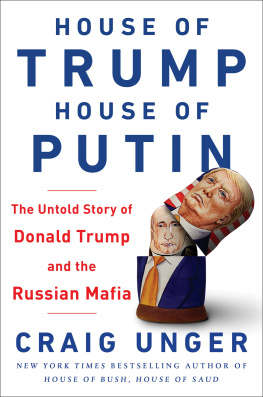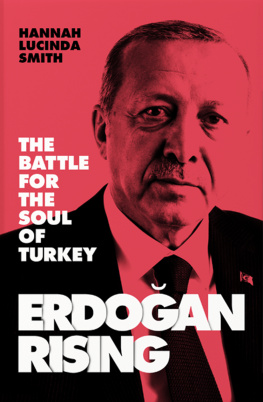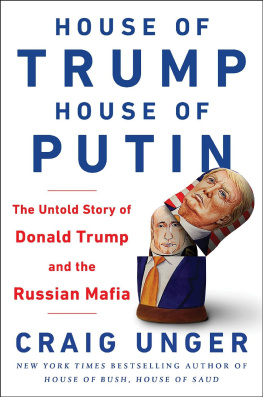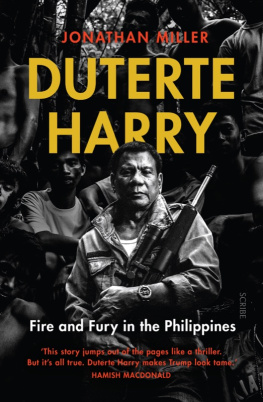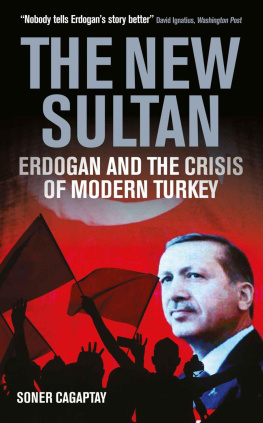Eve Ensler - Strongmen: Trump / Modi / Erdoğan / Duterte / Putin
Here you can read online Eve Ensler - Strongmen: Trump / Modi / Erdoğan / Duterte / Putin full text of the book (entire story) in english for free. Download pdf and epub, get meaning, cover and reviews about this ebook. year: 2018, publisher: OR Books, genre: Art. Description of the work, (preface) as well as reviews are available. Best literature library LitArk.com created for fans of good reading and offers a wide selection of genres:
Romance novel
Science fiction
Adventure
Detective
Science
History
Home and family
Prose
Art
Politics
Computer
Non-fiction
Religion
Business
Children
Humor
Choose a favorite category and find really read worthwhile books. Enjoy immersion in the world of imagination, feel the emotions of the characters or learn something new for yourself, make an fascinating discovery.
- Book:Strongmen: Trump / Modi / Erdoğan / Duterte / Putin
- Author:
- Publisher:OR Books
- Genre:
- Year:2018
- Rating:3 / 5
- Favourites:Add to favourites
- Your mark:
- 60
- 1
- 2
- 3
- 4
- 5
Strongmen: Trump / Modi / Erdoğan / Duterte / Putin: summary, description and annotation
We offer to read an annotation, description, summary or preface (depends on what the author of the book "Strongmen: Trump / Modi / Erdoğan / Duterte / Putin" wrote himself). If you haven't found the necessary information about the book — write in the comments, we will try to find it.
Strongmen: Trump / Modi / Erdoğan / Duterte / Putin — read online for free the complete book (whole text) full work
Below is the text of the book, divided by pages. System saving the place of the last page read, allows you to conveniently read the book "Strongmen: Trump / Modi / Erdoğan / Duterte / Putin" online for free, without having to search again every time where you left off. Put a bookmark, and you can go to the page where you finished reading at any time.
Font size:
Interval:
Bookmark:
The Return of the Monster
Vijay Prashad
The crisis consists precisely in the fact that the old is dying and the new cannot be born. In this interregnum, a great variety of morbid symptoms appear.
Antonio Gramsci, Prison Notebooks, 1930
T HE MONSTERS have returned. They are led by strongmenby Trump, by Modi, by Erdoan, by Duterte, and by others. But these are not really strong men. These are men who pretend to be strong, who hide behind ugly rhetoric that befuddles the masses, but who are nothing other than cowardly when it comes to social reality. Rather than confront the difficult problems that face usproblems of unemployment and starvation, humiliation and inequalitythey take refuge in an easy rhetoric of hate. It is so much easier to hate than to spend the time necessary to build the ramparts of a future world, one where the catastrophic social problems of today no longer define human existence. But the monsters of todaythe morbid symptoms of this period of transitiondo not care to tackle the problems of society. They blink at them, nod at them, and then move on to harsher prescriptions.
At first glance, these monsters appear to be like the fascists of the last centuryGermanys Adolph Hitler, Italys Benito Mussolini, Spains Francisco Franco, and Japans Hideki Tojo as well as Portugals Antnio de Oliveira Salazar, Romanias Ion Antonescu, and South Africas D.F. Malan. These men and their regimes are defined by the ugliness of their political agendas as well as their rhetoricbilious against social groups that they abhor. Violence is both their strategy and their tactic. The current monsters even resemble the monsters of the 1960s and the 1970s, the men who led the neo-fascist states through the military juntas (Argentina, Brazil, Chile, Greece, Indonesia, and Thailand); these were weak states that used force to extract resources at low prices for export and to produce markets for high value imported goodsall at the behest of multinational corporations and imperial centers.
But the current monsters are a shadow of the older fraternity. They do not advertise themselves as fascists, neither wearing the same emblems nor using the same rhetoric. Some of their followers carry swastikas on their signs, but most of them are more careful. They do not wear the uniform of the military, nor indeed call the military out of the barracks to lend them a hand. Their fascism is couched in modern rhetoricin the terms of development or trade, in the terms of jobs and social welfare for their nationals, in the language of threats from migrants and drug gangs. But the older language of the older monsters cannot stay away. It makes its appearance when the new monsters speak of migrants and of the vulnerable, of the social and political dissidents. They are treated as vermin that need to be exterminated. The military comes to the border or goes into the slums, bullets flying. Dislocation of society is their goal. Older, decadent language can be heard, the language of death and disorder.

Why have the monsters returned? They made their appearance in the West in the 1920s and 1930 when the workers movement had asserted itself and when capitalism went into a tailspin. At that time, the monsters came to suffocate the workers movement and to steady the capitalist ship. They broke up the parties of the Left and absorbed a section of the workers into their outfits. They attacked society, attacked its institutions and its confidenceleaving the militant workers of the Left vulnerable. The monsters, swollen with rhetoric as Gramsci put it, chastised society for its desire for a better world. Intimidation was the order of things, the fulcrum upon which the monsters were able to balance their own will to power with the desire to produce a social order to advantage big business. But even the capitalist had to appear to face their wrath. They took the capitalists into a room and scolded them for being insufficiently patriotic to capitalism. The class of capitalists had to protect capitalism against their individual capitalist interests. The monsters arrived to save capitalism from the militancy of the workers and the cupidity of the capitalists.
The monsters told people to fear their minions, the men who marched in ironed uniforms and with polished jackboots. If anyone strayed from the norm, the men in boots would descend on them. These fascists were the detritus of a decadent capitalism. Their ambitions were destroyed in the fires of war, their project compromised by their disgusting violence against humanity.
That was then; this is now. Why have these monsters returned?
These days, the workers movement is weak, debilitated by ideology and technologyby the lure of commodities and by the productivity of computers. Left parties are few, and if they exist, they are weakened by the difficulties of organizing the workers, the peasants, and the unemployedthe key classes who spend so much more time on social reproduction, on finding work, and on travelling to work than they ever did. Individual advancement as an ideological platform is an overwhelming barrier to collective projects of the Left. There is no immediate danger to capitalism in that direction. Bourgeois democracy is fully capable of draining the reservoirs of the Left. The capitalist class does not need fascism for this purpose. If fascists appear, it is not because the Left is a threat to the capitalists.
But capitalism itself is in disarray. Inequality rates are astounding. It is as if the very rich, of whom there are fewer and fewer, are of a different breed than the very poorof whom there are more and more. A thick and high wall has divided humanity. The poor imagine that they could become rich if luck struck them, but they know that the chances of this are minuscule. The rich, in turn, know that they will never be poor again. They have accumulated generations of wealth by taking advantage of the gibberish of the world of finance, the New Science, the new vocabulary of the alchemists of money: BISTRO, CDS, CDO, CDOs of ABSs, CDOs of CDOs, CDOs of CDOs of CDOs, RAROC, SCDOs, SIVs, SPOs, and VAR. Money makes money, financial instruments insure that the wealthy remain wealthy and that pension funds and middle-class investors feed the system to the advantage of the rich. The house always wins say those who run casinos. Financial exchanges, oxygenated by petrodollars and derivatives, always favor the wealthy. The rich have withdrawn their wealthto the tune of trillions of dollarsfrom either investment or from taxation, although they plow it into financial instruments that do little productive good for the economy. The rich are hoarding the wealth produced by the workers. They have weakened the economic system: its arteries are dry, its heart ready to seize. A small heart attack of the financial system in 2007-08 took place when the US housing market failed, and it set off convulsions across the system. Doctors have panicked. Other organs are in danger of failure. Next time, the heart of capitalism might fail altogether.
The monsters have returned because the masters of the New Science have not been able to manage the economy, the free-fall of inequality and humiliation. It is not that the workers and the unemployed workers are now stronger. They are weaker and more disorganized. But they are also angry. And anger can lead in many directions. It can tear society apart, drawing the bile of the torn social structure into family life and into inter-personal relations. It can create anti-social feelings that erupt in violence of all kinds, disassociations from community, hatred of class enemies. The atmosphere of rebellion can always exist without any real possibility of rebellion. Trade unions have been gutted, rural workers have been disinherited from their small plots of land, debt stalks ordinary people from one end of the world to the other, and Left parties are on the back foot. But anger remains. It festers. It could turn into aggression. It could threaten the lives of the richtheir homes on fire, their businesses smashed.
Next pageFont size:
Interval:
Bookmark:
Similar books «Strongmen: Trump / Modi / Erdoğan / Duterte / Putin»
Look at similar books to Strongmen: Trump / Modi / Erdoğan / Duterte / Putin. We have selected literature similar in name and meaning in the hope of providing readers with more options to find new, interesting, not yet read works.
Discussion, reviews of the book Strongmen: Trump / Modi / Erdoğan / Duterte / Putin and just readers' own opinions. Leave your comments, write what you think about the work, its meaning or the main characters. Specify what exactly you liked and what you didn't like, and why you think so.

